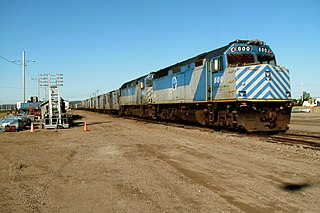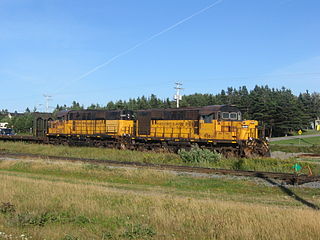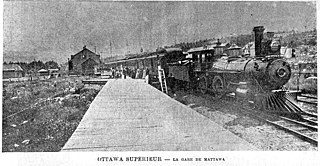
The Grand Trunk Railway was a railway system that operated in the Canadian provinces of Quebec and Ontario and in the American states of Connecticut, Maine, Michigan, Massachusetts, New Hampshire, and Vermont. The railway was operated from headquarters in Montreal, Quebec, with corporate headquarters in London, United Kingdom. It cost an estimated $160 million to build. The Grand Trunk, its subsidiaries, and the Canadian Government Railways were precursors of today's Canadian National Railway.
The New Brunswick East Coast Railway was a railway that operated in the Canadian province of New Brunswick.

The Hull–Chelsea–Wakefield Railway was a 33 km (20.5 mi) heritage railway in Quebec, Canada, running tourist trains through the scenic Gatineau Hills and beside the Gatineau River between Hull and the tourist town of Wakefield from May to October, using a 1907 Swedish steam locomotive, E2 class number 909, and 1940s-built Swedish passenger cars. On average, the railway attracted about 50 000 tourists and generated revenues of about $8 million for the region.
The Chemin de fer Arnaud, now Chemin de fer Arnaud Quebec is a private Canadian short line railway owned by Société ferroviaire et portuaire de Pointe-Noire (SFPPN) operating in the province of Quebec.
The Société des chemins de fer du Québec (SCFQ), or Quebec Railway Corporation in English, is a former Canadian railway holding company that owned several short line railways in the provinces of Quebec, Ontario, New Brunswick and Nova Scotia.

Tshiuetin Rail Transportation Inc. is a rail company that owns and operates a 217-kilometre (135 mi) Canadian regional railway that stretches through the wilderness of western Labrador and northeastern Quebec. It connects Emeril, Labrador with Schefferville, Quebec on the interprovincial boundary. The company also operates a 356-kilometre (221 mi) railway that connects Sept-Îles, Quebec to Emeril. The company is the first railway in North America owned and operated by Indigenous peoples, specifically by the Innu Nation of Matimekush-Lac John, the Naskapi Nation of Kawawachikamach, and the Innu Takuaikan Uashat Mak Mani-Utenam.

The Montreal–Gaspé train was a thrice-weekly passenger train operated by Via Rail between Montreal and Gaspé, Quebec.
The Canada Atlantic Railway (CAR) was a North American railway located in Ontario, southwestern Quebec and northern Vermont. It connected Georgian Bay on Lake Huron with the northern end of Lake Champlain via Ottawa. It was formed in 1897 through a merger of three separate railway companies that John Rudolphus Booth had either purchased or created, beginning in 1879. The CAR was owned by Booth for eight years after its formation until he sold it to the Grand Trunk Railway (GTR) in 1904.

The Quebec City–Windsor Corridor, also known as simply the Corridor, is a Via Rail passenger train service in the Canadian provinces of Quebec and Ontario. The Corridor service area has the heaviest passenger train frequency in Canada and contributes 67% of Via's revenue.

The Charlevoix Railway is a short-line railway that operates in the Charlevoix region of Quebec Canada. From 1994 to 2009 it was a subsidiary of the Quebec Railway Corporation, a short line operator. Since April 2009 it has been owned by Train touristique de Charlevoix Inc., a Groupe Le Massif Inc. subsidiary. With a length of 144–148 kilometres (89–92 mi) it connects the city of Clermont in the Charlevoix region to a freight yard of the Canadian National Railway (CN) located in the La Cité-Limoilou borough of the city of Quebec. The railway runs along both the St. Lawrence River and the Malbaie River and consists of a single non-electrified track.

Ottawa Valley Railway is a Canadian railway that operates 150 miles (240 km) of track in the provinces of Ontario and Quebec, and is owned by Genesee & Wyoming Canada Inc., the Canadian subsidiary of Genesee & Wyoming Inc.

The Chemin de fer de la Matapédia et du Golfe was a short line railway that operated in eastern Québec from 1998-2008.
The Chemin de fer Baie des Chaleurs was a short line railway that operated in eastern Québec from 1996 to 2007.
The Société du chemin de fer de la Gaspésie is a Canadian short line railway located in eastern Quebec operating 202.2 mi (325.4 km) of track from its interchange with Canadian National Railway (CN) at Matapédia in the west to the end of the line at Gaspé in the east, along the south coast of the Gaspé Peninsula.

The Canadian National Railway's Beachburg Subdivision or "Beachburg Sub" for short, was part of the former Transcontinental Mainline. The Beachburg Sub connected Ottawa to Brent, Ontario.

The Central Maine & Québec Railway was a Class II freight railroad operating in the U.S. states of Maine and Vermont and the Canadian province of Quebec with headquarters in Bangor, Maine. It was owned by Railroad Acquisition Holdings, LLC, a subsidiary of Fortress Investment Group, LLC. It is now a subsidiary of Canadian Pacific Railway since June 2020.

Western Labrador Rail Services, Inc. is a rail operation of Genesee & Wyoming Canada, Inc. created in 2010 by the combination of three short line railways: Arnaud Railway, Bloom Lake Railway, and Wabush Lake Railway. The operation provides rail transportation services to mining companies operating in the provinces of Newfoundland and Labrador and Québec, Canada.
The Quebec Oriental Railway was the name for a railway running along the southern shore of the Gaspe peninsula, Quebec, Canada, opened in 1907 from Matapédia to (eventually) Gaspe Town. The railway was taken over by Canadian National, which then split off its passenger services to VIA Rail, which shuttered the Montreal-Gaspe train line in 2013.

Mattawa station is a disused Canadian Pacific Railway train station in Mattawa, Ontario, Canada.












